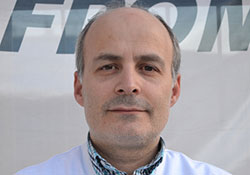Apostolos Veizis: On the front line of the refugee and migrant crisis in Greece

Médecins Sans Frontières
The medical humanitarian organization Médecins Sans Frontières (MSF) has worked to support people on the move in Greece since 1996. Apostolos Veizis is Director of the Medical Operational Support Unit for MSF in Greece. In this role, he is on the front line of the ongoing refugee and migrant crisis in Europe. Here, he shares his experiences.
Everything has changed since the closing of borders between Greece and its European neighbours last year. The “Balkan route” from Greece through the former Yugoslav Republic of Macedonia to Serbia officially shut down on 18 February 2016. The closure meant that people could no longer move forward from Greece. They continued to arrive at the islands and the mainland, but there could be no flow out of the country. Tent camps have been set up all over, including on the Greek islands, to accommodate these people. We call them “mushroom camps” because they have spread so much across Greece. There are now approximately 50 of these tent camps, full of more than 50 000 people just waiting.
In more than 15 years working in this area, this is the worst situation I have ever seen in Europe. Sometimes I think it must be a bad dream, but there is a tent camp 10 kilometres from my office. So this is not a dream. It is reality.
No longer in transit but stranded
Everything changes when you are dealing with a group of stranded people, rather than people in transit. We used to see people only briefly for quick health checks; they didn’t want to stop for health services because Greece was just a transit point for them – a place from which they hoped to move on quickly. Now we need to start looking at existing medical conditions, such as depression, anxiety, post-traumatic stress disorder and other mental health-related symptoms, along with pregnancy and disability. MSF is also active in certain areas of treating chronic diseases.
I manage the relationship between MSF and the humanitarian and medical sector in Greece, including civil society organizations, academic and medical institutions, research centres and other relevant actors throughout the country. My job is to contribute to identifying and then developing opportunities for MSF to work with partners to provide medical operational support. MSF was also authorized to provide vaccinations in Greece, and these efforts reached 10 500 children from the ages of 6 months to 17 years across the country in 2016.
Greece passed a law in 2016 that allows everyone in the country to access health care, including asylum seekers. But we still see many problems in terms of both access and capacity. Since the middle of 2016 MSF’s focus has transitioned to mental health, chronic disease and sexual reproductive health care in Greece. MSF is currently active in more than 20 different locations across the country. We handed over our primary health care activities to actors that received European funding to take on this responsibility.
We and many other organizations are confronted with the harsh realities and challenges of the Greek health care system. There is a lack of transportation to take patients to hospitals. There are few cultural mediators or translators in health care settings who have the language skills and cultural understanding to act as a bridge between patient and care provider. What’s more, sometimes we are able to treat people in hospitals – deliver a baby or perform an operation – but then we often send them back to a tent camp. Is that the best effort authorities can make in this situation? I don’t think so.
Changing health profile
The quality of living conditions, of course, is an extremely important factor for this stranded population. It is one thing to have substandard living conditions with poor-quality food, water and sanitation when the situation is temporary. It is another thing to live in terrible situations and to have complete uncertainty about when or even whether your situation will get better. At first, people hold onto their dreams of continuing on to other parts of Europe. But they soon realize this dream is over; they have to accept that they will stay in Greece, many living in deplorable conditions with little information about what the future holds.
In the past, anxiety was the number one health problem we treated in our mental health programmes, largely because people arriving in Greece were coming from areas of violent conflict or had experienced violence and trauma during their journey. Today, the number one health problem we see is no longer anxiety. It is depression, aggravated by the dismal living conditions and lack of information.
People feel insecure; they worry about their safety. They feel isolated and cut off from the information they need. They feel discriminated against. Living like this affects people’s mental health. It affects their mental well-being. If we define health using WHO’s definition – as a state of complete physical, mental and social well-being and not merely the absence of disease or infirmity – then we can’t say there is access to appropriate health care here.
More resources, new approaches needed
We need governments and international organizations to look at alternatives to the encampment system. We need funding for programmes for particularly vulnerable people, such as victims of violence or torture, unaccompanied minors and those with pre-existing medical conditions. We, as Europeans, need to move beyond political frustrations and bargaining and we need to work towards minimizing barriers for people who have fled some of the most violent conflicts, persecution and extreme forms of poverty of our time.
When it comes to people’s health, we need to try to put politics aside. We should not punish people for having to flee for their lives.
I am frustrated, but I am not without hope. I see that we are still able to help people, and this gives me hope.



